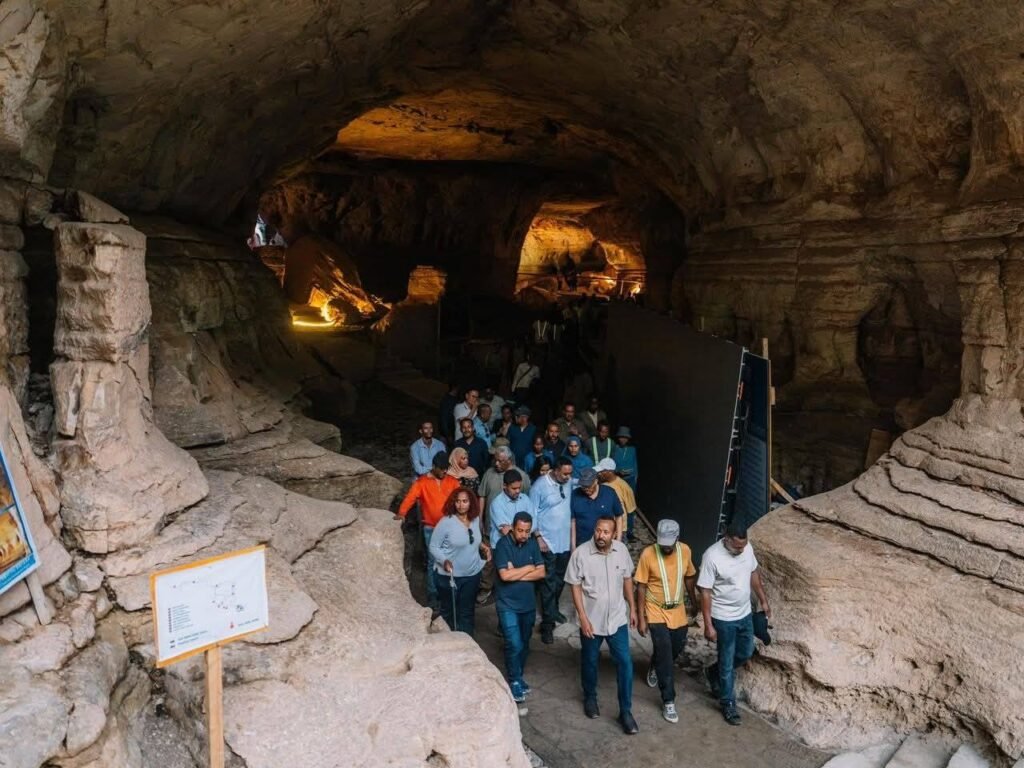Prime Minister Abiy Ahmed, accompanied by First Lady Zinash Tayachew and a high-level delegation of current and former leaders, visited Ethiopia’s Bale Zone in Oromia Region to review tourism, infrastructure, and agricultural development projects.
During the visit, the Prime Minister emphasized that Ethiopia is a land of plenty and enough for all when seen through the eyes of abundance. “Our shared task is to uncover, nurture, and build upon these treasures so that the next generation may carry the mantle forward,” he said.
The delegation toured Bale Mountains National Park, home to Ethiopia’s second-highest peak, Tullu Dimtu, and the Sanetti Plateau, which shelters endemic wildlife including the Ethiopian wolf and giant mole rat. The park’s extraordinary landscapes, forests, grasslands, and biodiversity make it one of Ethiopia’s strongest tourism attractions.
At the Sof Omer Cave, the near-completion of the Sof Omer Luxury Lodge and the ongoing Cave Development Project aim to provide premium accommodation and enhance visitor experiences. Nearby, the Dinsho Lodge, currently under construction, will further strengthen tourism infrastructure in the park.
In the Harenna cluster, projects under development include the Rira Eco Lodge, viewpoints, restaurants, and coffee shops along trails leading to Tullu Dimtu, promoting sustainable tourism while creating local employment opportunities.
The delegation also visited Fincha Habera Waterfall, flowing into the Weib River and feeding the Sof Omer Cave system, an area rich in birdlife and home to the Ethiopian Red Fox. Plans for a glamping site will make the area more welcoming for travelers.
The Robe–Goro–Sof Omer–Ginir Junction Road Upgrading Project, covering 29 kilometers and five bridges, links agricultural zones in East Bale with central Ethiopia, improving accessibility to tourist sites and fostering economic integration.
The Weib River Flood Control Project was also reviewed to regulate water flow inside the Sof Omer Cave, ensuring year-round accessibility while safeguarding the ecosystem. The Welmel River Irrigation Development Project in Delo-Mena Woreda was inaugurated during the visit. Initiated by the Ministry of Irrigation and Lowlands, the project will provide irrigation for 9,687 hectares of farmland, supporting around 20,000 households. It aims to improve agricultural productivity, enhance drought resilience, strengthen local water management, and create employment opportunities.
PM Abiy highlighted the connection between natural wonders and development progress, emphasizing tourism as a pillar of economic growth. Investments in lodges, ecotourism projects, roads, and flood control reflect Ethiopia’s commitment to sustainable development, local livelihoods, and environmental protection. “When we see through the eyes of abundance, we recognize that Ethiopia is a land of plenty and enough for all,” the Prime Minister said.

